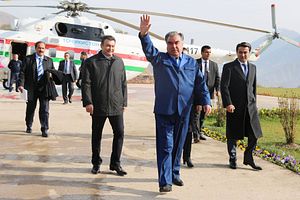In June, the European Council adopted conclusions on the EU strategy for Central Asia a decade after the European Union adopted its first regional strategy. The conclusions noted that “the depth of relations is linked to the ambitions and needs of individual Central Asian countries to take forward our bilateral relationships” followed by “their commitment to undertake reforms to strengthen democracy, fundamental freedoms, the rule of law, the independence of the judiciary, and to modernize and diversify the economy.”
There’s a disconnect between the EU’s (and other Western nations’) stated strategy goals and what has transpired in the region over the past 25 years.
Take democracy, for example. Since the EU adopted its 2007 Central Asia strategy, the only changes in top leadership in the region have come via revolution (Kyrgyzstan, 2010) or death (Islam Karimov, 2016). Only Kyrgyzstan’s elections, such as the 2015 parliamentary polls, have been viewed as relatively free and fair. This isn’t to say that the EU is responsible for Central Asia’s democratic dysfunctions, but rather that its efforts in this regard have met with little tangible success.
Bakhtiyor Sobiri, in an article today for openDemocracy, reviewed EU relations with Tajikistan in particular — a piece well worth reading because it peels back the veneer of good intentions to reveal the reality of what the EU’s efforts have achieved in the country. Namely, not much. For example:
Recent years have seen the introduction and implementation of a multi-year indicative programme for 2014-2020, under the auspices of which the EU has allocated some €251m to Tajikistan. At the same time, the trade turnover between the EU and Tajikistan is now two times lower than it once was. Why does Europe need this distant partner — seemingly so close, yet so far away? (emphasis added)
Stare at the bolded section for a moment longer. After years of engagement, including credits from the European Investment Bank and assistance in obtaining entry into the World Trade Organization, trade between Europe and Tajikistan is lower. With regard to a “commitment to undertake reforms to strengthen democracy, fundamental freedoms, the rule of law, the independence of the judiciary, and to modernize and diversify the economy” Tajikistan has been an abject failure.
As Sobiri notes, President Emomali Rahmon will “accept financing for reforms, without guaranteeing to carry them out.” The present status of politics in the country bear that statement out in full. (There is a whole lot more to Sobiri’s article, so go read it).
In Kyrgyzstan, perhaps the EU’s best chance at achieving the human rights goals in its strategy, there have been devastating setbacks recently. This week, a local media organization said it would likely have to shut down after five lawsuits alleging libel filed by the prosecutor general were determined in the state’s favor, totaling hundreds of thousands in restitution to be paid. EurasiaNet began it’s report on the development thus: “If the intention of Kyrgyzstan’s authorities was to destroy a prominent independent media outlet by suing it for libel, then top officials in Bishkek should crack open the champagne.” With freedom of the press usually accounted among fundamental freedoms, the situation is a decided setback. International engagement has helped cultivate independent media in Kyrgyzstan, but the government has proven it’s willingness and ability to stomp it down anyway.
Ultimately, as Sobiri and others have pointed out, the EU’s Central Asia strategy is built around energy and security, but even here there is delay and disappointment. Then German Foreign Minister Frank-Walter Steinmeier said in 2007 that “Economic links, energy-trading links can be one basis [for EU engagement with Central Asia], but it is just one among many… We are also very concerned about political stability in this context, which, as you know, is threatened by instabilities in the southern neighborhood, be it Afghanistan [or] be it Iran.”
A decade later, Afghanistan remains a war zone that has never spilled northward in any grand fashion and regional energy trading remains fraught with difficulty. Pipelines bringing gas from Turkmenistan to Europe remain a topic of discussion, but not progress. Political stability in the region is truly in the hands of regional leaders, rather than troubled or troublesome neighbors. And most regional leaders have done as Rahmon has: accepted financing for reforms and then continued with business largely as usual.

































